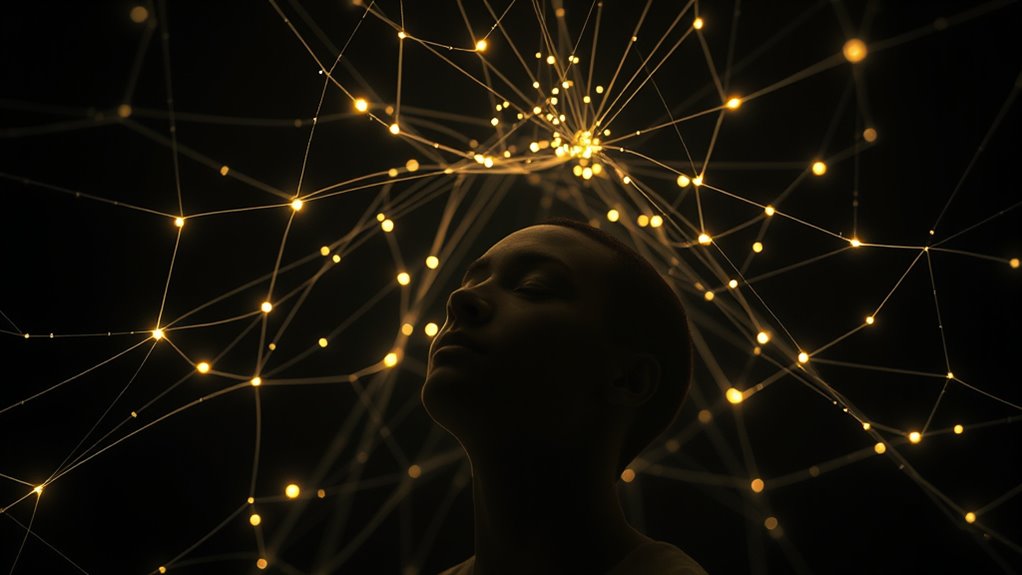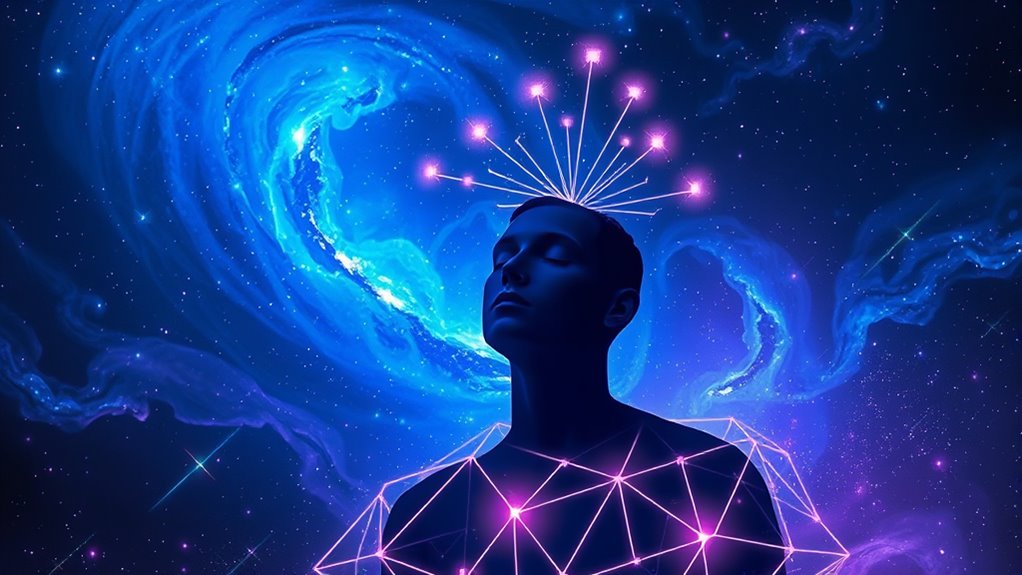Quantum entanglement links particles instantly across distances, challenging traditional ideas about how the universe works. Scientists wonder if this phenomenon influences human consciousness or if our minds share a connected, non-local network. While some theories suggest brain structures might use quantum effects, concrete evidence is still lacking, and skepticism remains. If you’re curious, there’s more to uncover about how entanglement could relate to awareness and the nature of reality.
Key Takeaways
- No definitive scientific evidence confirms that quantum entanglement directly influences human consciousness.
- Theories suggest potential quantum effects in neural structures, but this remains highly speculative.
- Current research explores entanglement as a metaphor for interconnectedness, not as an established mechanism in the brain.
- Most scientists remain skeptical about quantum entanglement playing a role in cognition or perception.
- Ongoing studies aim to clarify if and how quantum phenomena might relate to consciousness, but conclusive proof is lacking.

Quantum entanglement, a phenomenon where particles become interconnected regardless of distance, has intrigued scientists and philosophers alike for decades. This mysterious connection suggests that the state of one particle instantly influences another, no matter how far apart they are. Such a concept challenges classical ideas of locality and causality. When it comes to human consciousness, many wonder if entanglement might play a role in how our minds operate or connect across space and time. The implications of entanglement are profound, sparking debates about whether our consciousness could be linked through quantum processes. Some researchers propose that entanglement might help explain phenomena like shared thoughts, collective consciousness, or even telepathy, though these ideas remain highly speculative. The core question is whether the brain itself can harness or be influenced by quantum entanglement, or if it’s just a metaphor for interconnectedness.
In terms of entanglement implications, scientists explore whether quantum effects occur within neural structures. The challenge lies in the warm, noisy environment of the brain, which many believe would disrupt delicate quantum states. Still, certain consciousness theories suggest that quantum coherence might occur in microtubules or other neural components, potentially enabling a form of entanglement within the brain. If true, this could revolutionize how we understand perception, memory, and even the unity of conscious experience. It might imply that our thoughts are not isolated events but part of a larger, interconnected quantum network, thereby reshaping notions of individuality and collective awareness. Recent research in quantum biology is also investigating how quantum effects could persist in biological systems despite environmental noise, opening new avenues for understanding consciousness.
While these ideas are fascinating, they remain highly theoretical. Current evidence doesn’t definitively prove that the brain uses quantum entanglement, and many scientists remain skeptical. Still, the possibility invites us to reexamine longstanding questions about consciousness and reality. Could our minds be entangled with the universe or each other in ways we haven’t yet understood? If so, it would suggest that consciousness isn’t just a product of neural activity but possibly a quantum phenomenon extending beyond the brain. This perspective aligns with some consciousness theories that posit a non-local aspect to awareness, implying that our subjective experience might be connected in ways that defy classical explanations. As research advances, the line between quantum physics and consciousness studies continues to blur, leaving open the exciting possibility that understanding entanglement could reveal new insights into the nature of human awareness.

Quantum Physics for Beginners: From Wave Theory to Quantum Computing. Understanding How Everything Works by a Simplified Explanation of Quantum Physics and Mechanics Principles
As an affiliate, we earn on qualifying purchases.
As an affiliate, we earn on qualifying purchases.
Frequently Asked Questions
Can Quantum Entanglement Directly Influence Human Thoughts?
You wonder if quantum entanglement can directly influence your thoughts. Currently, scientific evidence doesn’t support this idea. While entanglement theories explore quantum communication between particles, applying this to human consciousness remains speculative. You should know that brain processes are complex and involve classical physics. Although fascinating, the idea that entanglement impacts thoughts isn’t proven, and more research is needed before drawing any conclusions.
How Does Consciousness Affect Quantum Particles?
Did you know that studies show human consciousness might influence quantum particles? When you observe a quantum system, you cause its wave function to collapse from a superposition of states into a definite outcome. While some theorize consciousness affects this process, scientific evidence remains limited. You influence quantum particles indirectly through measurement, but whether your awareness plays a direct role in wave function collapse is still an open question.
Are There Practical Applications of Quantum Entanglement in Medicine?
You might wonder if quantum entanglement has practical uses in medicine. Currently, researchers explore quantum diagnostics, which use entanglement to improve imaging and detection of diseases. Entanglement therapy is also in early stages, potentially offering new treatment avenues. These applications could revolutionize healthcare by providing more precise diagnostics and innovative therapies, though they’re still largely experimental. You’ll see how ongoing research could make these quantum approaches mainstream in the future.
Is Human Consciousness Entangled With the Universe?
Pondering whether your consciousness connects with the cosmos taps into tantalizing metaphysical theories. While some suggest a spiritual connection, scientific evidence remains elusive, and mainstream science hasn’t confirmed entanglement between human minds and the universe. You can explore this idea through philosophical reflections or spiritual practices, but remember, current knowledge doesn’t definitively prove that your consciousness is entangled with the universe. Keep questioning and seeking your own truth.
What Are the Ethical Implications of Using Quantum Effects in Mind Studies?
When exploring quantum effects in mind studies, you should consider ethical implications like privacy concerns and informed consent. You might inadvertently access sensitive mental data or influence thoughts without users fully understanding the risks. It’s vital that you guarantee participants are aware of potential impacts and give explicit consent. By prioritizing transparency and safeguarding personal information, you help maintain trust and uphold ethical standards in this emerging field.

QUANTUM COHERENCE IN MICROTUBULES: : Engineering the Quantum Mind: Attosecond Spectroscopy, Synthetic Biology, and the Future of Sentience Studies
As an affiliate, we earn on qualifying purchases.
As an affiliate, we earn on qualifying purchases.
Conclusion
So, after all this talk about quantum entanglement and consciousness, you might think scientists have uncovered the universe’s biggest secret. But here’s the irony—you’re still left figuring out your own mind, tangled up in questions, not particles. Maybe the real mystery isn’t about particles at all, but about how we perceive them. In the end, the universe keeps its secrets, and you get to enjoy the cosmic joke.

Introducing Microsoft Quantum Computing for Developers: Using the Quantum Development Kit and Q#
As an affiliate, we earn on qualifying purchases.
As an affiliate, we earn on qualifying purchases.

Powerforms Neutral Space Plate – Sacred Geometry Copper Energy Tool for Spiritual Protection, Clarity & Consciousness Alignment | Divine Truth Activator | Meditation Enhancement Plate | 6"x4.5"
✓ TRACK YOUR CONSCIOUSNESS EVOLUTION – Download the free ConsciousnessTrac app to measure your consciousness evolution across 5…
As an affiliate, we earn on qualifying purchases.
As an affiliate, we earn on qualifying purchases.









